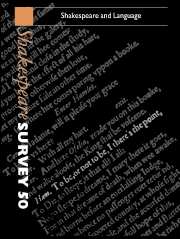Book contents
- Frontmatter
- Shakespeare’s Language and the Language of Shakespeare’s Time
- ‘I’ll plague thee for that word’: Language, Performance, and Communicable Disease
- The Language of the Spectator
- Marlowe’s Edward II: Penetrating Language in Shakespeare’s Richard II
- Hamlet’s Ear
- Secrecy and Gossip in Twelfth Night
- Shakespeare Rewriting Ovid: Olivia’s Interview with Viola and the Narcissus Myth
- ‘Voice Potential’: Language and Symbolic Capital in Othello
- Household Words: Macbeth and the Failure of Spectacle
- Erring and Straying Like Lost Sheep: The Winter’s Tale and The Comedy of Errors
- The ‘Shakespearian Gap’ in French
- Reading the Early Modern Text
- Shakespeare and the Metamorphosis of the Pentameter
- Rereading Illustrations of the English Stage
- Nietzsche’s Hamlet
- ‘Strange and woonderfull syghts’: The Tempest and the Discourses of Monstrosity
- Shakespeare Performances in England, 1996
- Professional Shakespeare Productions in the British Isles, January–December 1995
- 1 Critical Studies
- 2 Shakespeare’s Life, Times, and Stage
- 3 Editions and Textual Studies
- Books Received
- Index
3 - Editions and Textual Studies
Published online by Cambridge University Press: 28 March 2007
- Frontmatter
- Shakespeare’s Language and the Language of Shakespeare’s Time
- ‘I’ll plague thee for that word’: Language, Performance, and Communicable Disease
- The Language of the Spectator
- Marlowe’s Edward II: Penetrating Language in Shakespeare’s Richard II
- Hamlet’s Ear
- Secrecy and Gossip in Twelfth Night
- Shakespeare Rewriting Ovid: Olivia’s Interview with Viola and the Narcissus Myth
- ‘Voice Potential’: Language and Symbolic Capital in Othello
- Household Words: Macbeth and the Failure of Spectacle
- Erring and Straying Like Lost Sheep: The Winter’s Tale and The Comedy of Errors
- The ‘Shakespearian Gap’ in French
- Reading the Early Modern Text
- Shakespeare and the Metamorphosis of the Pentameter
- Rereading Illustrations of the English Stage
- Nietzsche’s Hamlet
- ‘Strange and woonderfull syghts’: The Tempest and the Discourses of Monstrosity
- Shakespeare Performances in England, 1996
- Professional Shakespeare Productions in the British Isles, January–December 1995
- 1 Critical Studies
- 2 Shakespeare’s Life, Times, and Stage
- 3 Editions and Textual Studies
- Books Received
- Index
Summary
EDITIONS
Stephen Orgel’s Oxford Shakespeare edition of The Winter’s Tale is a pleasure to read. His introduction shows critical sophistication and a commitment to historical scholarship that both delights and instructs. In a play as editorially straightforward as The Winter’s Tale Orgel can afford to treat the text conservatively. He is often stoutly resistant to editorial ‘improvement’ of what he calls ‘Shakespeare’s sense’, and his textual discussion affirms that ‘the complexity and obscurity of the verse can only be authorial’ (p. 83). The claim in itself sounds transparent and straightforward, but the position of the author within editorial configurations of the text continues to be debated in many of the studies reviewed below.
Orgel edits undeflected by these theoretical complications, elegantly interweaving text and commentary, commentary and introduction. In just one case Orgel makes a strikingly innovative change to the text where a commentary note might have been more diplomatic. A couple of lines before Antigonus exits pursued by a bear we read the bracketed direction 'Storm, with a sound of dogs barking and hunting horns' (3.3.55). Here Orgel's strong sense of Winter's Tale as a precursor of The Tempest seems to spill over into the text. The call for a storm, or, as the Mariner anticipated some lines before, 'loud weather', is, admittedly, a constructive addition. Dogs and horns, however, are doubtful. Their justification lies partly in a literal reading of the Shepherd's reference a few lines later to 'these boiled-brains of nineteen and two-and-twenty' who 'hunt this weather', and partly on reading Antigonus' response to whatever he sees or hears, 'This is the chase', to mean that the bear is being hunted. Shakespeare does not elsewhere use 'chase' to mean a hunted animal.
- Type
- Chapter
- Information
- Shakespeare Survey , pp. 267 - 290Publisher: Cambridge University PressPrint publication year: 1997



